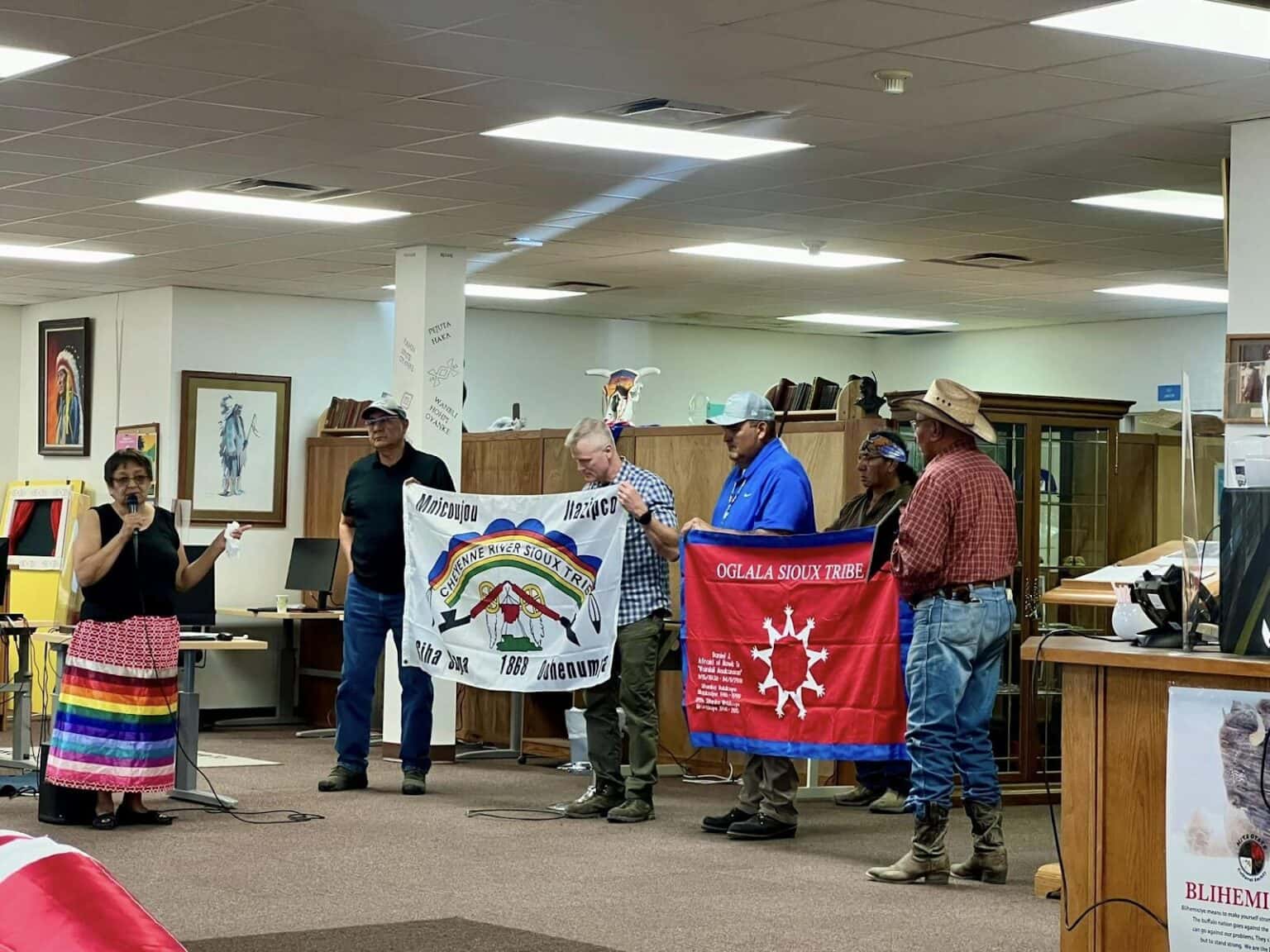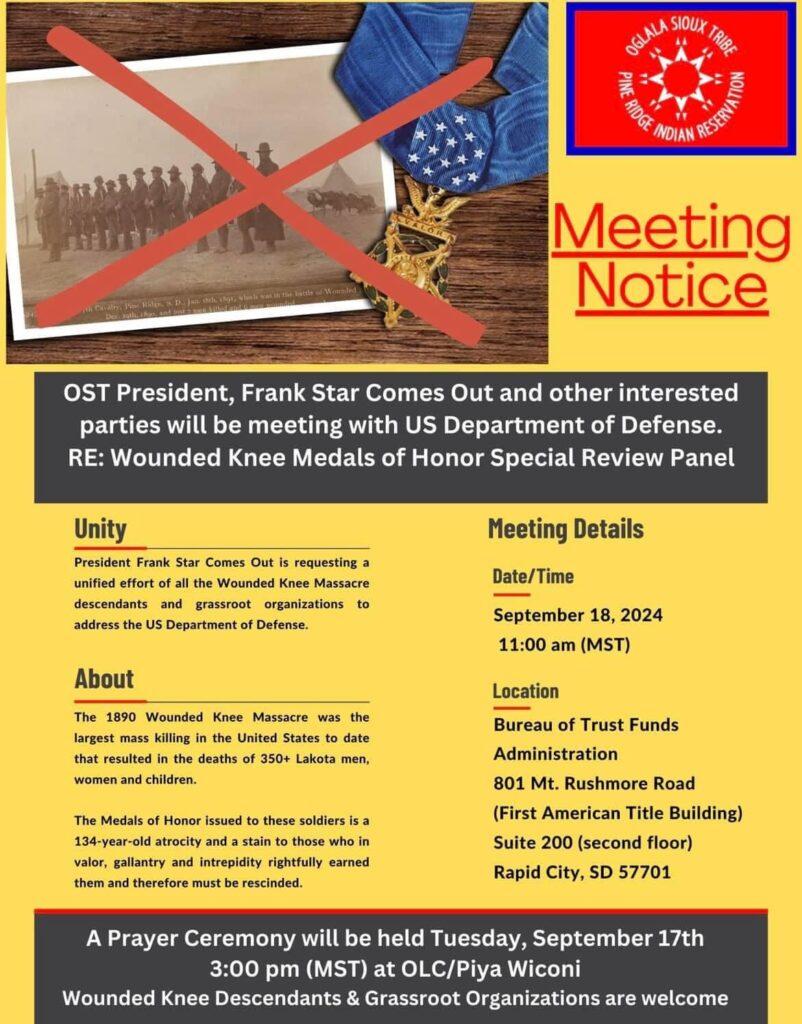
Wounded Knee descendants Prayer ceremony and oral history accounts at Oglala Lakota College Library. From left, Marlis Afraid of Hawk, John Afraid of Hawk, Panel Chair Tom James, and Justin Pourier. (Photo Credit/ Facebook/Frank Star Comes Out)
At a hearing last week in Rapid City, S.D, a roomful of people offered more than six hours of testimony. Area tribes testified in favor of revoking military Medal of Honor awards to cavalrymen of the 1890 Wounded Knee Massacre.
Descendants of massacre victims and survivors answered an invitation from Oglala Sioux Tribal President Frank Star Comes Out to join the hearing on Sept. 18. The live broadcast took place pursuant to Defense Secretary Lloyd Austin’s July order for a review of the 19 Medal of Honor awards.
Robert Anderson, the Interior Department’s principal deputy solicitor, joined review panel chair Tom James in the hearing. Anderson will prepare a report for the Defense Department, which will submit recommendations to President Biden, according to James.

The speakers carried on a century-old pressure campaign to rescind the honors that stem from one of the worst massacres in the country’s Indian Wars. In addition to being descendants of massacre survivors, many witnesses spoke from their perspectives as military veterans. It was the U.S. 7th Cavalry that gunned down over 300 unarmed Lakota men, women, and children after their surrender at Wounded Knee, S.D.
Star Comes Out, a veteran, argued the medals violated military rules of engagement, as the soldiers killed unarmed civilians. “I don’t see any honor in that… They should be court martialed instead of honored,” he said.
Cheyenne River Sioux Tribal Chairman Ryman LeBeau highlighted the intergenerational trauma the massacre has inflicted on the Lakota people. “My grandmother would say, ‘There’s a pervasive sadness throughout our people.’ And I believe she was talking about that historical trauma that we all carry.” His grandmother Marcella LeBeau served as a World War II nurse and fought for revocation of the medals until her death at 102.
“The White Buffalo Calf Woman came to give us a message… This is a prophecy she sent me to tell you—that you will get these awards rescinded.”
Cheryl Dupris, retired paratrooper and sister of Arvol Looking Horse
Cheyenne River Sioux citizen Manny Iron Hawk spoke of losing his grandfather, uncle and other relatives during the massacre on the Pine Ridge Reservation. A high school teacher, he recounted his grandmother’s harrowing account of her survival. Growing up with such stories he and others said the emotional and psychological impact passed down over the years.
“We talk about trauma in the DNA, and that transferred to me—but I want to stop that,” he said. “This issue is our fight today. We need to finish it. We don’t want to pass it on to our children and grandchildren. We descendants look at this as a medicine way.”
Iron Hawk received cheers for telling officials,”You have the authority to make this right. Either revoke all the medals, or don’t revoke them at all.”
“We talk about trauma in the DNA, and that transferred to me—but I want to stop that.”
Wounded Knee Descendant Manny Iron Hawk
Janet Alkire, the first woman elected to chair the Standing Rock Tribe, linked the massacre to the prior killing of Chief Sitting Bull. She said, “Had Sitting Bull not been arrested, Wounded Knee would never have happened.”
When Minneconjou Chief Spotted Elk, known to the settlers as Big Foot, learned of Sitting Bull’s assassination, he knew there would be trouble, as Dee Brown relates in “Bury My Heart At Wounded Knee.” He gathered his band and headed toward Pine Ridge. En route the 7th Cavalry intercepted them, escorted them to the place where they camped along Wounded Knee Creek. It was there the following morning that the massacre occurred.
An Air Force veteran who served in both Desert Shield and Desert Storm, Alkire said, “Medals are for valor and bravery.” The soldiers at Wounded Knee “did not demonstrate that. It’s like a slap in the face, too, because you don’t kill women and children,” she said.
Cedric Broken Nose, a descendant of Wounded Knee survivors, shared his family’s painful history, including how his great-grandfather had instructed relatives to keep mum about it. “Do not tell the story,” Broken Nose paraphrased. “Otherwise, the United States government is going to find you and do the same thing to you, too – to eliminate you.”

Cheryl Dupris, retired paratrooper of the Army’s 82nd Airborne, brought a prophecy to the hearing. She is a sister of Arvol Looking Horse, who is the designated carrier of the Great Sioux Nation’s White Buffalo Calf Woman’s sacred bundle.
“The White Buffalo Calf Woman came to give us a message to the Miniconjou,” she said. “She told us the prophecy of the military coming, the white men coming, the invaders. But this is a prophecy she sent me to tell you—that you will get these awards rescinded.”
Sicangu Lakota grandmother and water protector Cheryl Angel was among several witnesses who noted the troops at Standing Rock and Wounded Knee were acting outside their jurisdiction. They should not have deployed after the 1868 Fort Laramie Treaty that reserved the territory for the Seven Council Fires of the Great Sioux Nation.
The treaties signed between Native nations and the U.S. government were supposed to uphold the welfare of her people, she said. “We signed treaties and were massacred even as we honored them,” she said. “Because we agreed to live in peace. Now give that to us,” she said.
“My relatives, it’s been over a hundred years,” said Angel. “Start somewhere. Rescind those medals, now, Biden. It’s a good time to start.”
A more extensive account of the testimonies can be found at The Esperanza Project.
Barnett, Tracy. Wounded Knee Massacre: “They should be court-martialed, not honored.” The Esperanza Project, Sept. 26, 2024.
Clark, Joseph. Austin Orders Review of Wounded Knee Medals, July 24, 2024. US Department of Defense website.
H.R.3371, Wounded Knee Massacre Memorial and Sacred Site Act, Tuesday, September 19, 2023
Kent, Jim. Daughters Of The American Revolution Recognize Lakota Elder Marcella LeBeau, SDPB Radio.
U.S. Department of the Interior Indian Affairs: https://www.bia.gov/bia/ots/fee-to-trust#
Brown, D. (1970). Bury my heart at Wounded Knee: An Indian history of the American West. Holt, Rinehart & Winston.
Barnett, T. (2024, August 8). Wounded Knee Massacre victims’ descendants urge feds to go beyond review, rescind soldiers' honor medals at last. Buffalo’s Fire.
This story was reported from live-streamed video coverage of the hearing from the Facebook pages of Oscar High Elk, 2KC Media, and Oglala Sioux Tribal President Frank Star Comes Out. The reporter viewed from Guadalajara, Jalisco, Mexico.
Tracy L. Barnett
Contributing Editor
Help us keep the fire burning, make a donation to Buffalo’s Fire
For everyone who cares about transparency in Native affairs: We exist to illuminate tribal government. Our work bridges the gap left by tribal-controlled media and non-Native, extractive journalism, providing the insights necessary for truly informed decision-making and a better quality of life. Because the consequences of restricted press freedom affect our communities every day, our trauma-informed reporting is rooted in a deep, firsthand expertise.
Every gift helps keep the fire burning. A monthly contribution makes the biggest impact. Cancel anytime.






